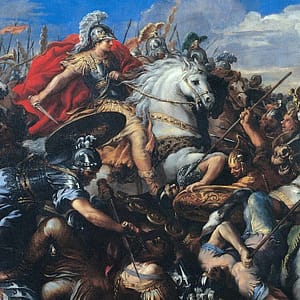Alexander the Great: Philosopher King and Propagator of Wisdom

Introduction
The name Alexander the Great resonates not only for his military conquests but also for his profound philosophical inclinations. Beyond the battlefield, Alexander’s worldview, heavily influenced by Aristotle, the great philosopher of antiquity, played a pivotal role in shaping his leadership style and motivating his troops. This blog delves into the philosophical facets of Alexander’s life, exploring his views on the world, the impact of Aristotle, and his unique approach to inspiring his men in the crucible of war.
Alexander’s Worldview
Alexander’s philosophical outlook transcended the battlefield, reflecting a deep contemplation of the human condition and the world around him. The conqueror of vast empires was not merely a military tactician but a thinker who sought to understand the intricacies of governance, culture, and the interconnectedness of civilizations. His vision extended beyond the Macedonian borders, embracing a cosmopolitan perspective that aimed at the amalgamation of diverse cultures.
In his conquests, Alexander implemented policies that encouraged the blending of Greek and Persian cultures, fostering an environment of mutual understanding and cooperation. This cultural fusion, known as Hellenization, laid the groundwork for the dissemination of knowledge, art, and philosophy across his vast empire. Alexander’s worldview was one of unity, envisioning a harmonious coexistence of diverse peoples under a shared cultural umbrella.
Influence of Aristotle
The indelible mark of Aristotle, Alexander’s tutor during his formative years, left an enduring imprint on the young king’s mind. Aristotle’s teachings encompassed a broad spectrum of subjects, including philosophy, ethics, politics, and natural sciences. The philosophical bond between teacher and pupil was profound, shaping Alexander’s intellectual framework and governing principles.
Aristotle’s emphasis on reason, virtue, and the pursuit of knowledge resonated deeply with Alexander. The philosopher instilled in him a sense of duty and responsibility, fostering a commitment to the well-being of his subjects. The concept of the “Philosopher King,” as articulated by Aristotle in his seminal work “Politics,” found embodiment in Alexander’s reign. The king was not just a conqueror but a ruler driven by a quest for wisdom and the betterment of his realm.
Motivating His Men in War
Alexander’s prowess on the battlefield was matched only by his ability to inspire and motivate his troops. His leadership style transcended the conventional, blending elements of charisma, strategic acumen, and a profound understanding of human psychology. The bonds forged between Alexander and his soldiers were not solely based on authority but rooted in a shared sense of purpose and mutual respect.
One of the key motivational strategies employed by Alexander was leading by example. He was often at the forefront of battles, personally engaging in combat alongside his men. This not only showcased his bravery but also cultivated a sense of camaraderie and unity within the ranks. The “comradeship” that Alexander fostered was a testament to his belief that a leader should share the burdens and risks faced by his soldiers.
Additionally, Alexander employed effective communication to maintain the morale of his troops. His speeches before battles were not mere exhortations but carefully crafted narratives that appealed to the collective identity of his diverse army. He spoke of shared glory, the pursuit of a common destiny, and the rewards awaiting those who stood steadfast in the face of adversity.
Alexander’s motivational techniques extended beyond the battlefield to the realms of policy and governance. His vision of a multicultural empire required a delicate balance of power-sharing and cultural integration. By appointing Persians to key administrative and military positions, Alexander demonstrated a commitment to inclusivity, fostering a sense of belonging among his diverse subjects.
Conclusion
Alexander the Great, often lauded for his military exploits, was equally a philosopher king who sought to transcend the boundaries of conquest. His worldview, influenced by Aristotle, reflected a vision of unity and cultural amalgamation. Alexander’s ability to motivate his troops went beyond traditional leadership, incorporating elements of shared purpose, personal example, and effective communication.
In the tapestry of history, Alexander stands not only as a conqueror but as a visionary leader who recognized the power of philosophy to shape civilizations. His legacy endures not only in the echoes of battles but in the cultural tapestry he wove across the ancient world—a testament to the enduring impact of a king who embraced the wisdom of his philosopher mentor.
Thank you for reading! Please fill out my follow form below to subscribe to my email list to never miss a blog.
